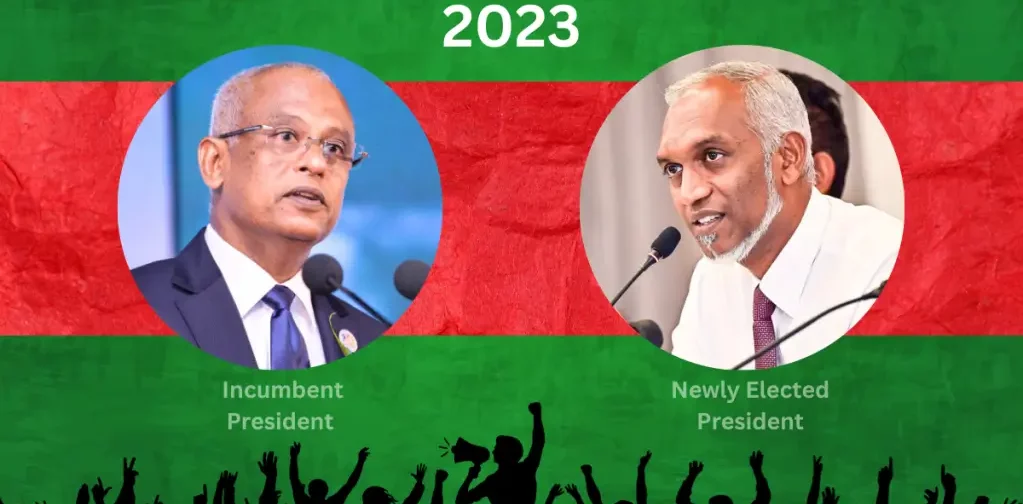
- Home
- About
- Knowledge Center
- Legislative Landscape
- Resources
- #TOGETHERFORBHARA
In the picturesque Maldives, the presidential election has transformed into a vital referendum, determining which regional power, India or China, will wield the most significant influence in the Indian Ocean archipelago state. The Presidential Election of September 9, 2023, featured eight contenders. Two candidates emerged as strong competitors, while the remaining six trailed behind. With no one securing the required 50% majority, a second round was set for September 30 by the Election Commission, intensifying the suspense for the nation’s highest office.
Across 187 islands, there are 570 polling stations where people cast their votes for their preferred leadership, including presidential, parliamentary, and local council elections. The main opposition candidate Mohamed Muizzu, who was the candidate from the People’s National Congress and also the mayor of Male, surprisingly secured a lead with 54% of the vote, in comparison to the incumbent president, Ibrahim Mohamed Solih. He is set to be sworn in as the President on November 17, 2023.
Navigating India-China Relations
India and the Maldives have a history of diplomatic, defense, economic, and cultural ties. However, relations deteriorated during the presidency of Abdulla Yameen (2013 to 2018) due to his anti-India stance and closeness to China. During this period, the Maldives shifted closer to China and joined China’s Belt and Road project. Yameen sought financial support from China when India and Western lenders were hesitant to assist due to human rights concerns. He is currently serving an 11-year prison sentence for corruption and is ineligible to run in the recent election. Mohamed Muizzu, the current president, is viewed by some, “as a representative for Yameen ”, who had a poor relationship with India, which made China an appealing option for support from the opposition.
The Sinamale Bridge is a Chinese-funded project that is a 2.1km bridge connecting the capital (Male), with the international airport on a different island. The Chinese government provided a grant of US$126 million out of a total of US$210 million. It was originally called the China–Maldives Friendship Bridge due to funding received from the Chinese government. India has also offered substantial loans and grants, but some individuals in the Maldives hold negative perceptions about India’s motives. Another concern is that the Maldives could face problems due to the activities between India and China rising along their Himalayan border. Many people in the Maldives believe that “it’s best to avoid getting deeply involved with any country, including India, in terms of strategic relationships”.
Newly elected Muizzu holds a Doctorate in civil engineering from the University of Leeds in the UK and he entered into politics in 2012 as Minister of Housing. Also, he is the mayor of the capital, Male, who campaigned on a platform of reducing ties with India, using the slogan “India out” approach, calling for Indian military personnel to leave the Maldives and seeking stronger relations with China. It shows that, in contrast to Solih, the 45-year-old Muizzu, a member of the Progressive Alliance coalition, leans toward establishing closer relations with China.
Solih (2018-2023), has prioritized strengthening relations with India, pursuing an “India-first” policy because of the Maldives’ historical, cultural, and economic ties with India Now, he will continue to serve as the interim president until his successor is officially inaugurated.
The relationship with the Maldives is important for India. The strategic location of the Maldives in the Indian Ocean is vital for energy supplies to China, Japan, and India. This raises the Maldives’ geopolitical importance in the presence of China’s growing navy. Maldives’ SAARC membership is crucial for India’s regional leadership. The Indian population and a thriving tourism industry further solidify these ties. Eku Verin events which is a joint military exercise held every year since 2009 between India and Maldives.
The Maldivian government is worried that the opposition’s “India Out” campaign could harm their relationship with India, jeopardizing vital bilateral support. On the other hand, the presence of the Indian military is seen as a threat which leads to security concerns. The “India First” policy in the Maldives is expected to persist, given India’s critical role in the country’s security. However, escalating tensions could have consequences for all parties involved.
Over the years, India’s strategy was to preserve its regional influence while simultaneously upholding the sovereignty of the Maldives. This is a nuanced and delicate balancing act, particularly in light of the geopolitical rivalry between India and China. In 2023, India’s approach is not only for the Maldivian people but also for the broader Indian Ocean region. It is characterized by a comprehensive and equitable strategy. It prioritizes democratic principles, enhances economic cooperation, fosters security collaborations, and upholds the sovereignty of the Maldives. India’s approach is centered on the advancement of democratic principles, the strengthening of economic collaborations, and the protection of shared interests within the Indian Ocean region.
